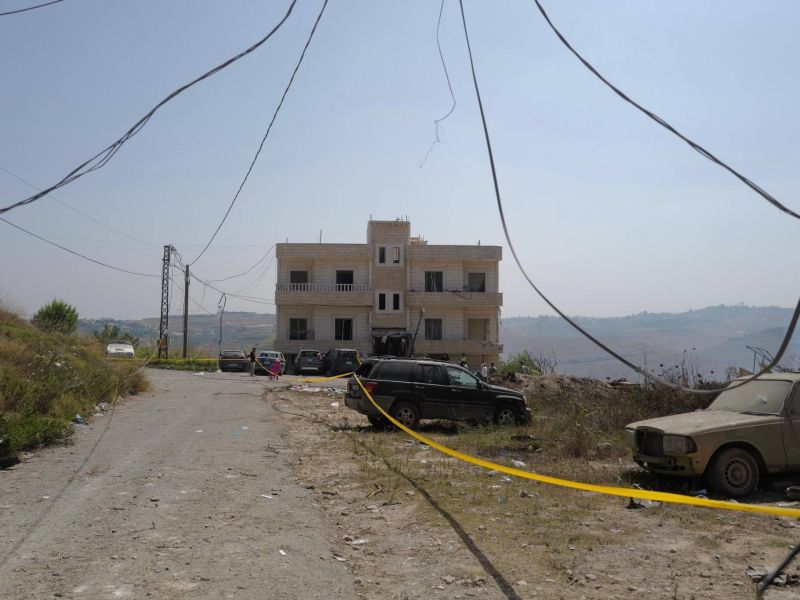
The apartment building where two women were killed by an Israeli strike that targeted the building next to it, on June 14, 2024 in Jenata, southern Lebanon. (Credit: Matthieu Karam/L'Orient Today)
“I can’t wrap my head around what happened,” Ali’s expression is blank, still in shock from the Israeli bombing beside his home along the road between Jenata and Deir Qanoun al-Nahr. Initially, the 30-year-old refused to talk about “the night the world ended.” But eventually he shares the difficult truth — two of his neighbors killed, his wife in intensive care, and his 8-month-old daughter Rawane in Jabal Amel hospital.
Around midnight, Israeli fighter jets bombed a three-story building with such ferocity that residents thought there was an earthquake and some say they heard the explosion from 15 kilometers away. The targeted building, in Sour district, southern Lebanon, was reduced to rubble, leaving pockets of fire. Two women were killed: Dalal Ezzeddine and Sally Salaiki, a paramedic for the Amal Movement’s al-Risala Scouts medical association. Nineteen others were wounded, including children.
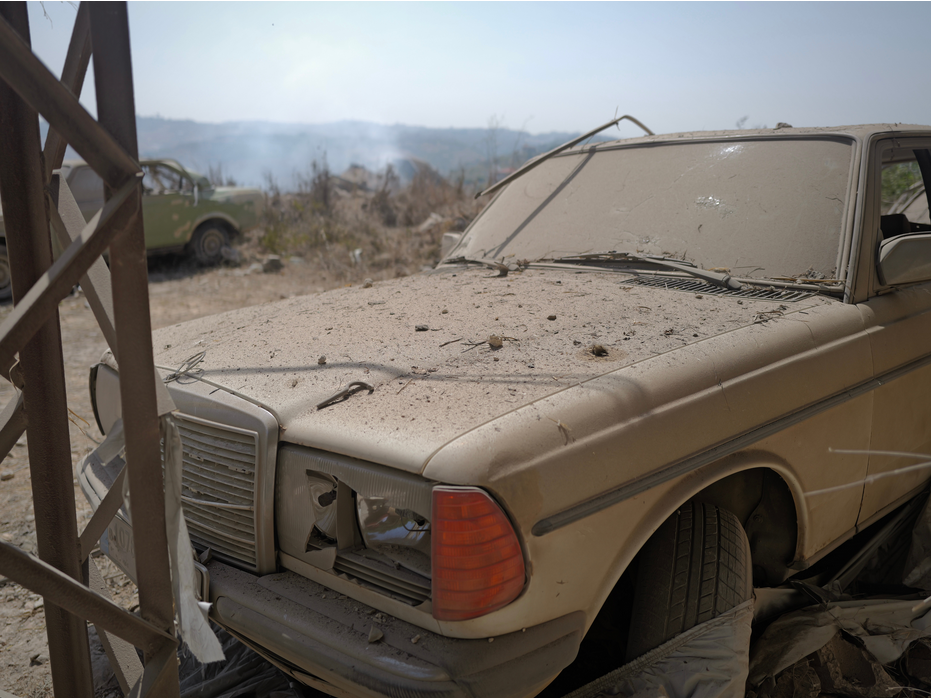 A vehicle damaged by the previous night's Israeli strike on a building in Jenata, southern Lebanon, on June 14, 2024. (Credit: Matthieu Karam/L'Orient Today)
A vehicle damaged by the previous night's Israeli strike on a building in Jenata, southern Lebanon, on June 14, 2024. (Credit: Matthieu Karam/L'Orient Today)
Ali’s friend called him that night; his car had broken down and he needed some help. Five minutes before the strike, Ali left his wife and two children, who were spending the evening with Sally, sitting on the terrace outside of the apartment building they all lived in. He heard the explosion from far away and rushed immediately home, fearing the worst.
He was among the first to arrive at the scene. The dust had not yet settled and smoke filled the air. “I saw things no one should see. There were civilians, lots of children. I thought I was going to find my family dead, that I was going to have to carry them, lifeless.”
He managed to find his daughter, blown away from where she had been sitting by the force of the explosion. His 5-year-old son was trying to free his mother from under the rubble, removing debris from the stone that had landed on her. Beside her was Sally’s body.
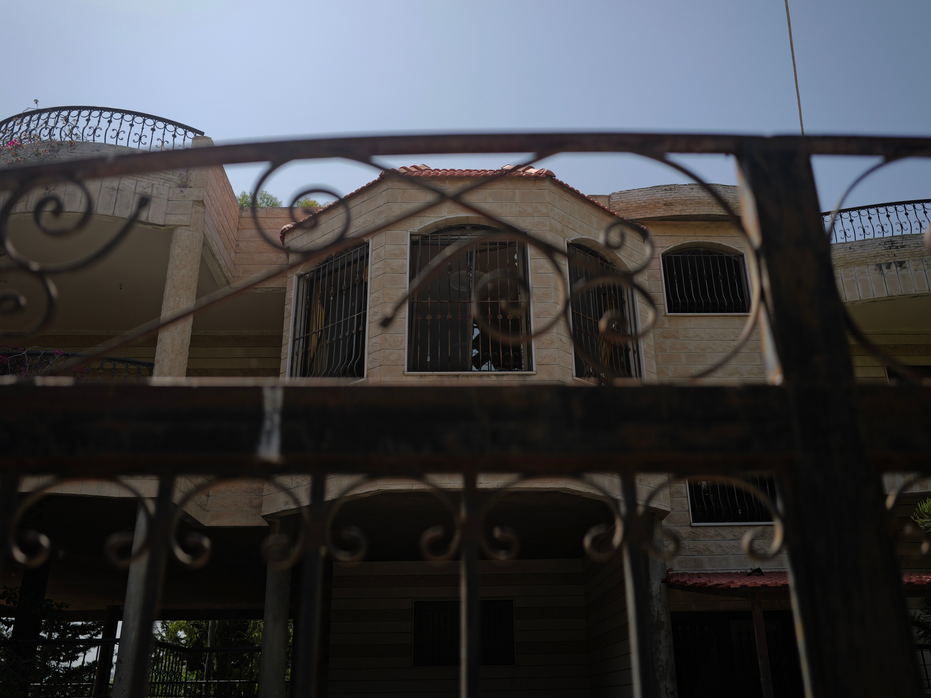 A villa damaged by a nearby Israeli strike, June 14, 2024 in the village of Jenata in southern Lebanon. (Credit: Matthieu Karam/L'Orient Today)
A villa damaged by a nearby Israeli strike, June 14, 2024 in the village of Jenata in southern Lebanon. (Credit: Matthieu Karam/L'Orient Today)
Soon paramedics and firefighters from Civil Defense, al-Risala Scouts and Hezbollah’s Islamic Health Committee arrived and the wounded were taken to three different hospitals in the city of Sour.
"Everything was just destruction," says Ali Safieddine, head of Sour’s Civil Defense center. He was in the ambulance that took Ali’s daughter Rawane to the hospital. "It was the strongest strike we've seen."
Once they had wrapped up rescue operations, Safieddine turned to one of his colleagues and remarked: "This is how the 2006 war started."
At the hospital where his family is being treated, Ali has just brought back some personal items for his wife, who has a fractured back and pelvis. There's "nothing left" of his house. For the time being, he plans to stay with his in-laws in Sour.
"I didn't expect Deir Qanoun to be targeted,” he says. “We're a long way from the border, so we felt safe. That's no longer the case.”
Yellow tape
Deir Qanoun is 21 kilometers from the border with Israel, northeast of the city of Sour. The majority of cross-border strikes between Hezbollah and Israel happen within 10 kilometers of the border, although Israel has been increasingly targeting sites further into Lebanon, particularly in Bekaa.
On the road leading to Ali’s home, at first sight, life seems to have gone back to normal. Cars drive by, shops are open, a florist waters his plants. "We're used to it," he says nonchalantly.
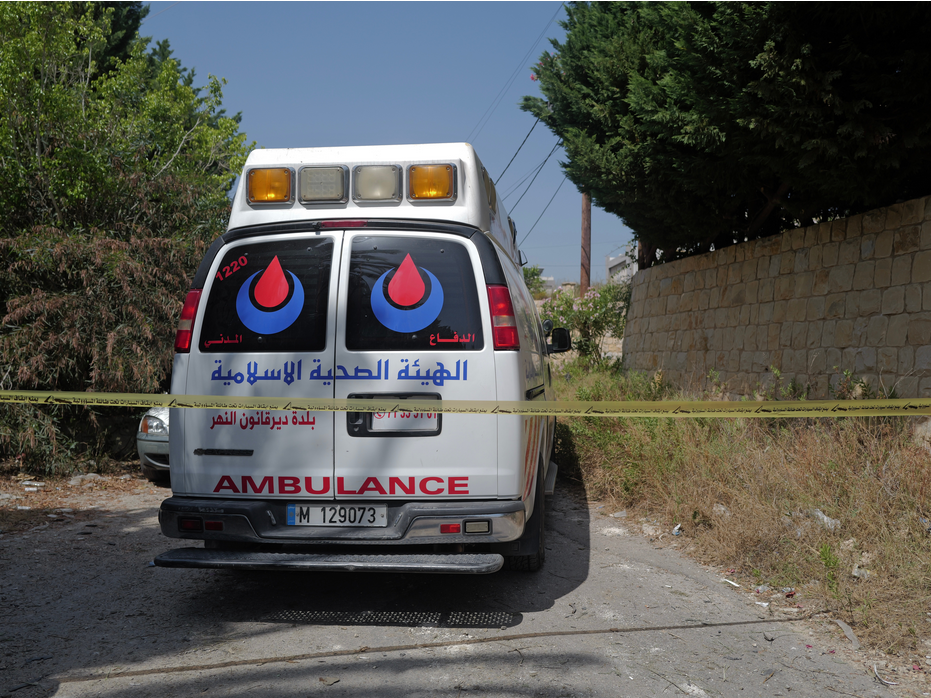 An ambulance from Hezbollah's Islamic Health Committee near a building targeted by an Israeli strike the night before, in Jenata, southern Lebanon, on June 14, 2024. (Credit: Matthieu Karam/L'Orient Today)
An ambulance from Hezbollah's Islamic Health Committee near a building targeted by an Israeli strike the night before, in Jenata, southern Lebanon, on June 14, 2024. (Credit: Matthieu Karam/L'Orient Today)
But at the entrance to Jenata, a residential street is blocked by civilian vehicles without license plates. Yellow tape marks the no-go zone. Hezbollah men in civilian clothes and a few of the party's paramedics ensure that neither journalists nor curious passers-by approach the area where the building that was targeted once stood. In its place is a pile of smoking rubble and destroyed solar panels.
“It used to be a carpentry shop,” says one of the Hezbollah men. Another admits the building belonged to the party, but won't elaborate.
Only a nearby residential building, which suffered heavy damage, can be photographed by the press. This is where Sally and Dalal were killed.
Not far from the yellow tape, an irritated woman is discussing the strike with her friends. “We’re talking about the fact that it was among civilian dwellings…” she says but one of her friends cuts her off, warning her against saying too much, or the wrong thing.
She tries again: "We're angry about what happened, about the people we lost, about the fear we felt. We don't feel safe here, because Israel is bloodthirsty. We are afraid for our children now.”
“I don't like blood,” she says, “But may God grant that we emerge victorious against our enemies!"
She’s interrupted again but this time by the loud whistling sound of a salvo of rockets being launched from somewhere nearby toward the same enemies she has just referred to. Her friend keeps repeating: "Let's put an end to Israel.”
‘I should have insisted...’
A few minutes' drive from the site of the strike, residents are flocking to offer their condolences to Sally's family, while women from al-Risala welcome the visitors.
Behind them, a young woman leans against the wall, looking worn down and exhausted. "We were sending each other messages just five minutes before," says Tarwada, her voice trembling.
Sally had called her that night. She was scared of the sounds of Israeli planes already active in the night sky and she had asked Tarwada to come stay with her for comfort.
"I should have insisted that she come to my house... She'd still be here," she says before collapsing. Some of the women run to catch her, to hold her up. "Be strong," they say.
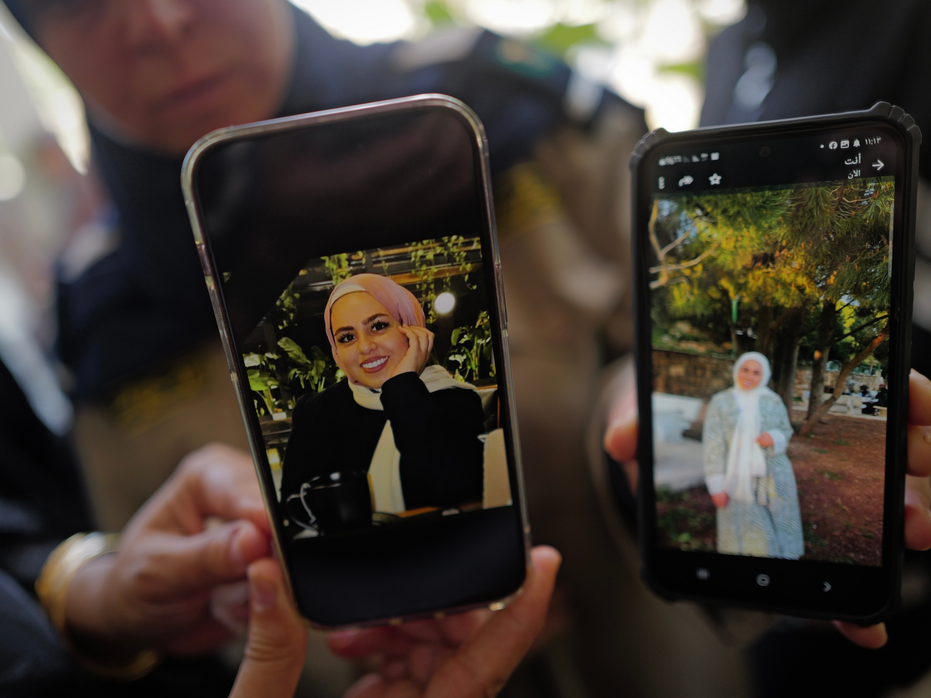 Two women holding portraits of Sally Salaiki, killed by an Israeli strike the night before in Jenata, southern Lebanon, June 14, 2024. (Credit: Matthieu Karam/L'Orient Today)
Two women holding portraits of Sally Salaiki, killed by an Israeli strike the night before in Jenata, southern Lebanon, June 14, 2024. (Credit: Matthieu Karam/L'Orient Today)
Standing beside Sally's grandmother, one of her colleagues recalls how the young woman "felt like she was going to be a martyr.”
“When we got to the hospital, we found Sally in a fridge," her cousin Mohammad says, standing in the garden and seething with anger. "The response should be strong. It's the only logical thing to do when innocent people die.”
Nearby people are paying the respects to Dalal Ezzedine, who was due to travel with her 17-year-old daughter to Abidjan, Côte d'Ivoire, on Friday to visit her two other children.
"She hadn't seen them for two years. On the night of the attack, she had come to say goodbye," says her brother-in-law, showing a video of the apartment. The wall facing the targeted building is completely blown out and the living room is covered in debris, stones, and a thick layer of dust. A corner of the couch pokes out from under the pile of rubble, the fabric stained with blood.
Dalal's daughter was released from hospital on Friday afternoon. "She's in shock and can't say a word," he says.
Youssef Zalzali, one of Dalal's neighbors, believes that Israel “overstepped” with the attack, extending beyond “proportionate retaliation.”
“We have always defended a dissuasive response, while protecting civilians,” he says. "There is no longer any fear. In view of this heavy attack, we can't expect the victims to stand idly by. Either civilians are safe everywhere, or nowhere.”
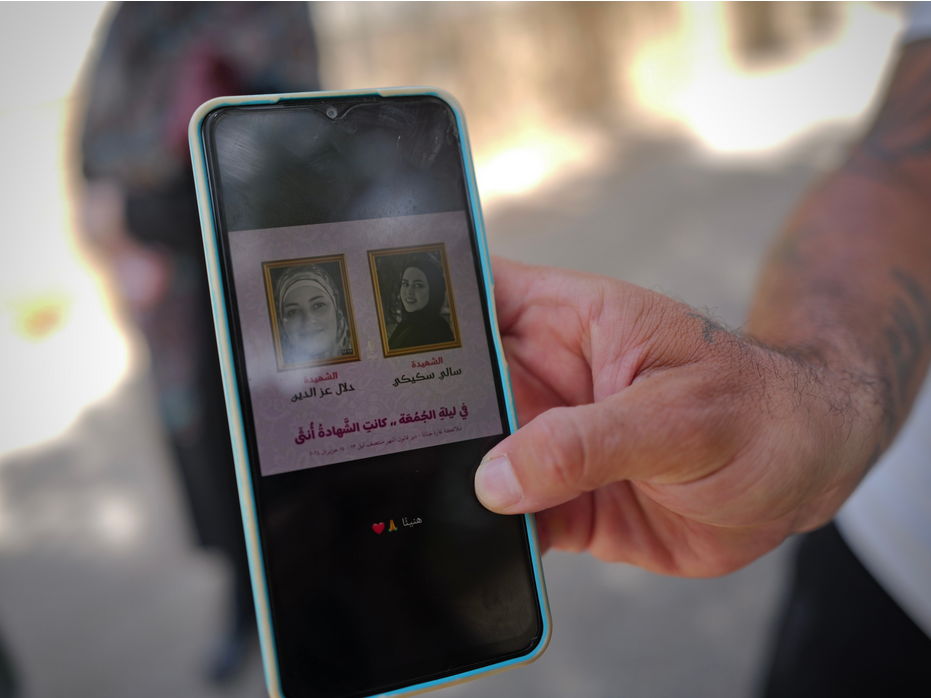 A man shows the portraits of the two victims of the Israeli strike, Dalal Ezzeddine and Sally Salaiki, on June 14, 2024, in Jenata, southern Lebanon. (Credit: Matthieu Karam/L'Orient Today)
A man shows the portraits of the two victims of the Israeli strike, Dalal Ezzeddine and Sally Salaiki, on June 14, 2024, in Jenata, southern Lebanon. (Credit: Matthieu Karam/L'Orient Today)
Hezbollah claimed responsibility for two attacks on Israeli positions on Friday in retaliation for the strike that killed Sally and Dalal. “Dozens of Katyusha rockets and Falaq missiles" were fired at Kiryat Shmona and Kfar Szold, the party announced, while buildings "used by soldiers" in Metula were targeted, “causing injuries.”
While some call for fierce retaliation, others fear further escalation.
"We are afraid that this war will spread. We're scared for our children,” says one mother, who has come from a village in Nabatieh district with her two daughters to visit the site.
Another woman says that she believes Hezbollah cares about the people of the south, even though she’s critical of the party’s presence among them.
"If it's the case,” that the targeted building belonged to Hezbollah, she says, “Then they have no right to settle among us, but I doubt it, because they're worried about us too.”
Israeli strikes in Lebanon since October have killed 71 civilians and 21 medics, and around 100,000 people have been forced to flee their homes. "We're tired of this war,” she says.
This article originally appeared in French on L'Orient-Le Jour and was translated into English by Amelia Hankins.

